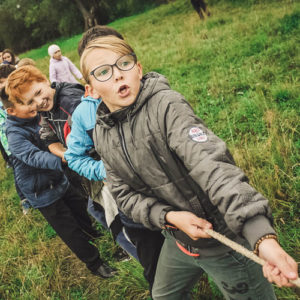 Kids tease. There’s nothing nice about it but it happens. On one level it’s often about one child teasing another child about their name, surname, hair colour, or a mistake they have made. I like to give kids the benefit of the doubt and trust that it’s just light-hearted humour. Collectively we all have a tendency to be too serious and over sensitive.
Kids tease. There’s nothing nice about it but it happens. On one level it’s often about one child teasing another child about their name, surname, hair colour, or a mistake they have made. I like to give kids the benefit of the doubt and trust that it’s just light-hearted humour. Collectively we all have a tendency to be too serious and over sensitive.
A deeper level of teasing involves embarrassing a child about their nationality, a scar, a physical or mental health challenge, their family’s religion or their family’s health choices. If our child is stirred by these comments then we need to consider a way forward.
Yes, we can raise the issue with the school if the teasing is ongoing and distressing or shapes itself into bullying. With premature intervention though we may risk taking the ball and running with it ourselves rather than giving our child an opportunity to resolve the issue for them self.
We can certainly coach our child from the sidelines but there’s a big difference between guiding our child and interfering every time they face a conflict. We need to bolster our child’s confidence and use the opportunity to teach them life strategies.
Family discussions around teasing (and bullying, if it leads to that) are incredibly valueable. Together we can examine if the child/children involved may be acting out at others because of their own family stress, this is rampant today in our modern world. We need to also consider if they are teasing our child because of their own individual family beliefs on the topic that plays out as certain behaviours. This allows for discussions on how families are different.
Some families for example, use sarcasm to communicate rather than having safe, open hearted debates and conversations about topics. Here family members don’t feel safe to express an opinion nor investigate topics for themselves and so use sarcasm as their weapon of choice. When questioned furthered on their beliefs they often become angry and defensive and have little substance to the rationale. It’s possible these kids haven’t really explored the topic or issue themselves at all, which is a great opportunity to discuss how ignorance can happen at any age.
In these situations, it’s incredibly important we ask our kids how they feel about what’s been said and why they feel that way? Here we can gauge if they themselves want to better understand and examine their own family’s beliefs and behaviours. It’s important they ask questions, investigate the belief or the topic, and wrestle with their own thoughts and feelings.
All in all, situations like this are fabulous opportunities to explain to our children that even though they may feel hurt or embarrassed – the world is a friendly place and people in general are friendly and inclusive. Challenges arise for our benefit and are doorways to build our intestinal fortitude. To explore our thoughts, beliefs and gifts.
Each of us, are here in this lifetime for a specific, individual reason. To give to the world in a unique way, using our unique gifts. No one else can fulfil our individual blueprint or destiny. Others may forget their gifts by trying to be like everyone else, but not us. We know that it’s okay to be different. To look different, to act differently and to think differently. To be willing to stay open to our gifts and inner magnificence.
When we teach our kids to back themselves, to embrace living a purpose driven and fulfilling life. Then they anticipate that no matter what happens to them, it is always for them, and the universe always has their back.
Finally challenges with others are invitations to better understand our-selves, human nature and to learn greater communication skills when navigating the crowd. As always there are opportunities in both pleasure and pain.


